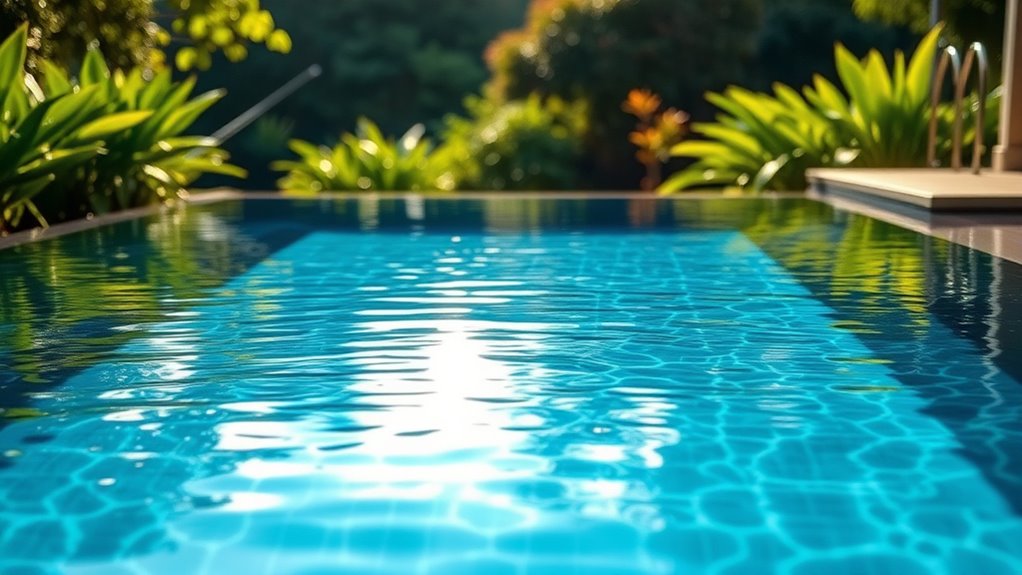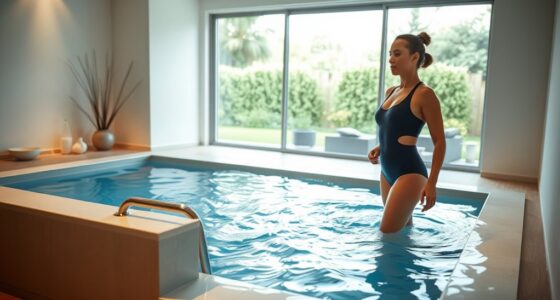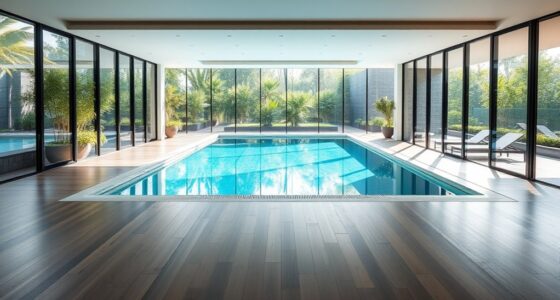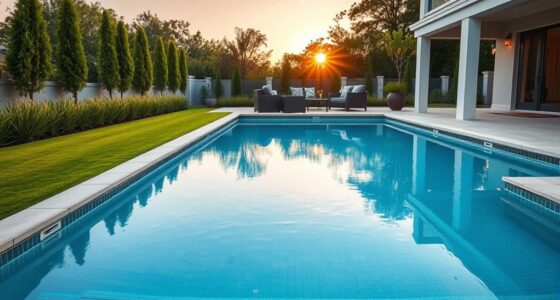Endless pools generally operate quietly, producing a gentle hum from the pump that usually stays between 50 and 70 decibels. You might notice a steady background sound similar to conversation or soft music, which doesn’t tend to disturb most households. Factors like pump size, installation, and maintenance can influence noise levels. If you want to know how to keep your pool even quieter, there’s more to explore for a peaceful setup.
Key Takeaways
- Endless Pools typically produce a steady hum between 50-70 decibels, similar to background conversation or music.
- Noise levels are mostly from the pump and jet system, which are generally quiet and unobtrusive.
- Proper installation on insulated surfaces and sound barriers can significantly reduce operational noise.
- During high-speed or workout modes, the pool generates louder, more consistent sounds, but still within a comfortable range.
- Regular maintenance and strategic placement help minimize noise, making pools less disruptive in household environments.
Understanding the Typical Noise Levels of Endless Pools
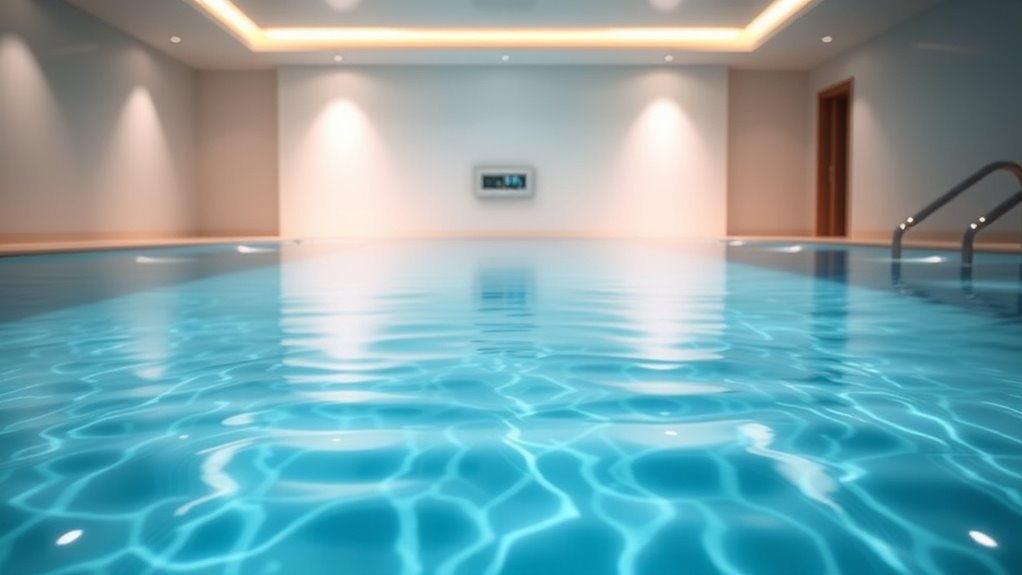
Endless pools are generally designed to operate quietly, but their noise levels can vary depending on several factors. Typically, you’ll notice a gentle hum from the pump when it’s running, which is normal. Most models produce noise levels around 50 to 70 decibels—similar to a conversation or background music. You might also hear the whirl of the jet system during use, but this is usually not loud enough to disturb your peace. The sound is steady and continuous, often blending into your environment rather than standing out. Overall, an endless pool’s noise is minimal compared to outdoor or traditional pools, making it suitable for use in indoor spaces or quiet residential areas. Proper maintenance can also help reduce operating noise and keep your pool running smoothly.
Factors That Influence Noise in Your Pool Setup
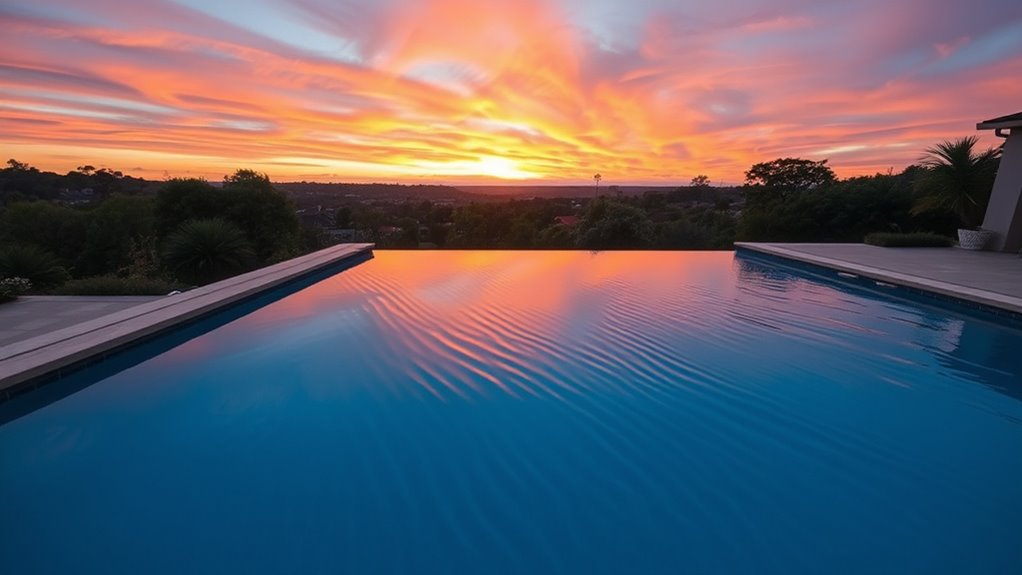
While most endless pools operate quietly, several factors can influence the noise levels you experience. The pool’s pump and filtration system are primary contributors—larger, more powerful units tend to be louder. The placement of your pool also matters; installing it on a solid, insulated surface reduces vibration noise, while placing it near walls or hard surfaces can amplify sounds. Pipe size and plumbing layout influence sound transmission; longer or more complex plumbing can generate additional noise. External factors like nearby equipment, wind, or environmental noise can also affect your perception. Additionally, the vibrational energy produced by the system may impact overall noise levels. Ultimately, the pool’s maintenance state impacts noise levels—clogged filters or worn-out parts may cause the system to work harder and become louder. Understanding these factors helps you manage and minimize noise in your setup.
Comparing Endless Pool Noise to Other Household Sounds
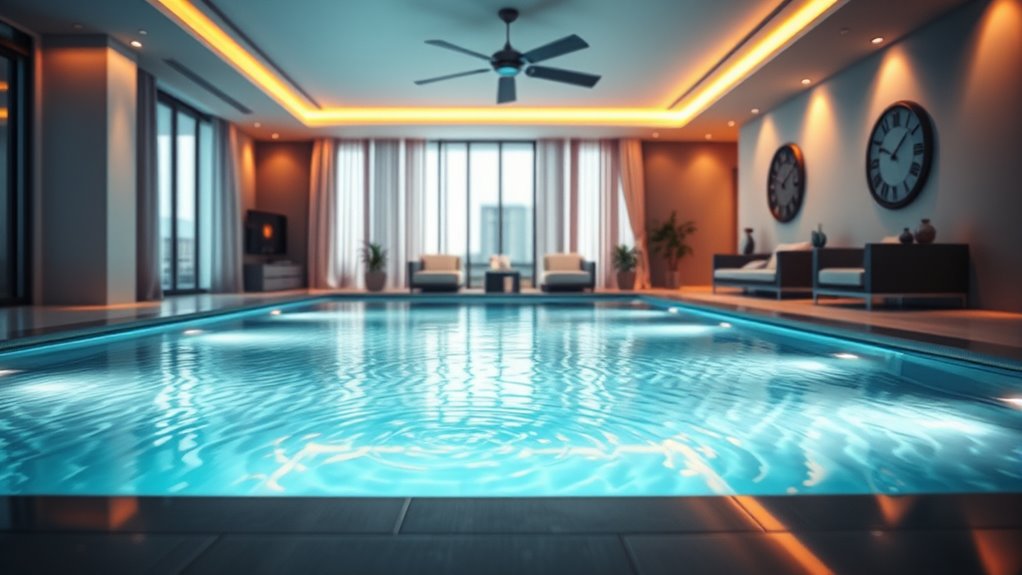
Compared to many common household sounds, the noise from an endless pool is often surprisingly quiet. You might hear a gentle hum, similar to a dishwasher or air purifier, but it usually doesn’t interfere with daily activities. To give you a clearer idea, here’s a quick comparison:
| Household Sound | Approximate Noise Level (dB) |
|---|---|
| Refrigerator | 40-50 |
| Dishwasher | 50-60 |
| Hairdryer | 70-80 |
| Vacuum Cleaner | 70-80 |
| Endless Pool (average) | 55-65 |
This shows that your pool’s noise level stays within a comfortable, unobtrusive range, making it easier to relax or work nearby. Additionally, understanding micro-mobility options can help integrate quiet and sustainable solutions into your lifestyle.
Tips for Minimizing Noise and Creating a Quiet Environment
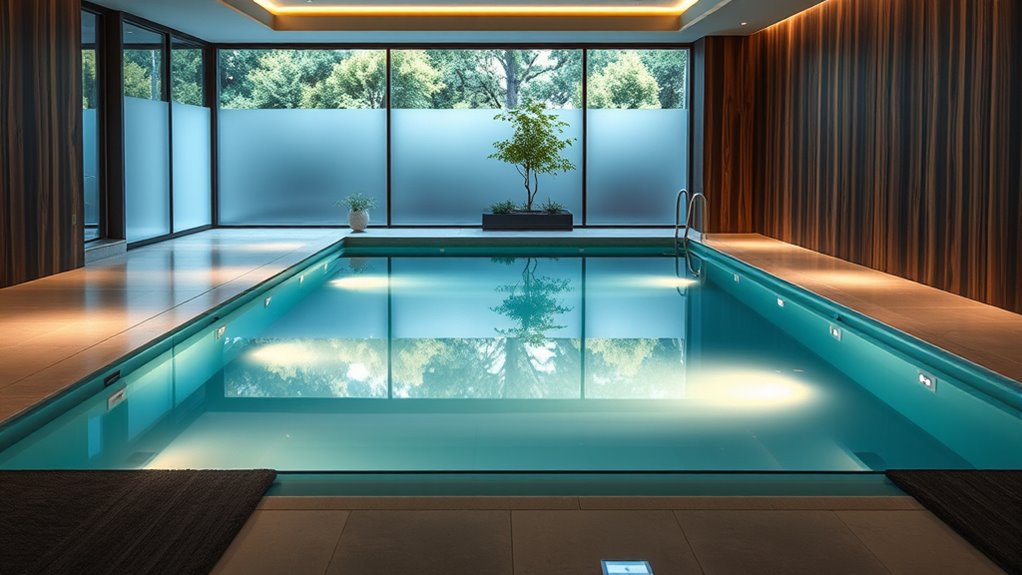
To create a quieter environment around your pool, start by locating it away from bedrooms and main living areas to minimize disturbance. Proper placement reduces noise transfer and helps maintain a peaceful space. Consider installing sound barriers like fences, shrubs, or acoustic panels around the pool to absorb sound waves. Regular maintenance, such as tightening pumps and cleaning filters, can also reduce unnecessary noise. Using a pool cover when the system isn’t in use minimizes vibration and airborne sound. If your pool has adjustable features, operate them during times when noise won’t disturb others. Additionally, choosing a location with natural barriers, like trees or hills, can help dampen sound. Being aware of noise levels and how to manage them is crucial for maintaining a peaceful environment. Implementing these tips creates a more serene environment, allowing you to enjoy your pool without undue noise concerns.
What to Expect During Different Operating Modes
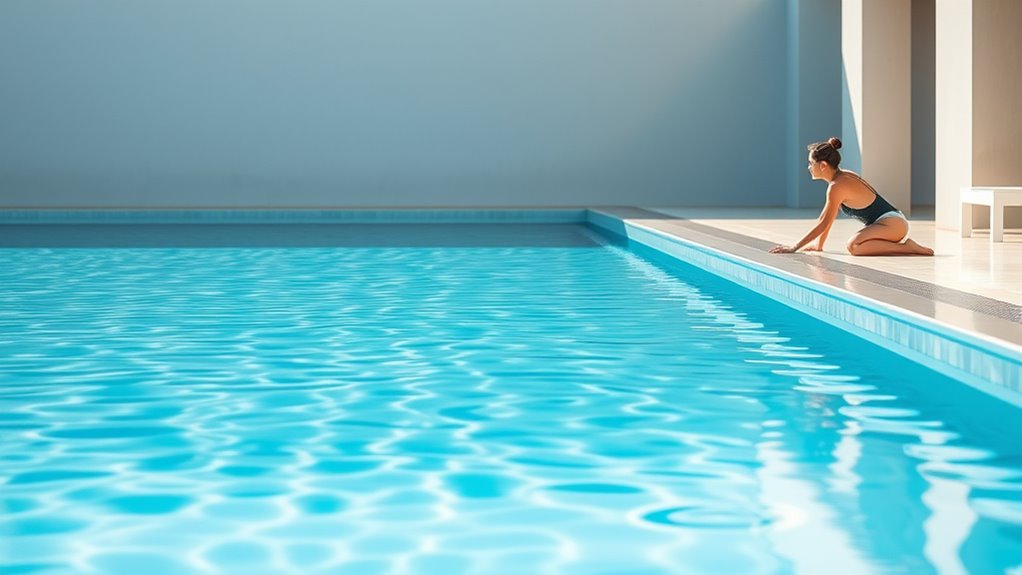
Understanding what to expect during your pool’s different operating modes can help you manage noise levels effectively. When the pool runs in standard mode, it typically produces minimal noise—mainly the gentle hum of the pump. Switching to high-speed or workout modes increases the motor’s activity, which elevates noise levels noticeably. During these modes, you’ll hear a more consistent, louder hum, especially if the pump runs at higher speeds. Some pools also have a “maintenance” or “filter” mode, which can generate intermittent sounds as filters cycle on and off. Knowing these differences allows you to plan for noise, whether it’s during quiet times or workout sessions. Additionally, incorporating eco-friendly crafting practices into your routine can help create a more serene environment by reducing overall noise pollution. By understanding each mode’s sound profile, you can adjust your environment or operating schedule for a more peaceful experience.
Frequently Asked Questions
Do Noise Levels Vary Between Different Endless Pool Models?
Yes, noise levels vary between different endless pool models. You’ll notice some models operate more quietly thanks to advanced pump technology and soundproofing features. Cheaper or older models tend to be noisier because they lack noise-reducing innovations. When shopping, check specifications and user reviews to find a model that suits your noise preferences. Investing in a quieter model guarantees you enjoy your pool without disruptive sounds.
Can Pool Location Inside or Outside Affect Noise Exposure?
Placing your endless pool outside turns the volume down to a whisper, practically silent compared to indoor setups! Inside, echoes and confined space can amplify noise, making it feel like a jet engine. The environment drastically impacts sound levels, so if you crave peace and quiet, go outdoors. Indoors, you might need extra soundproofing, but outside, you’ll enjoy a tranquil swim without the noise hassles of an enclosed space.
How Does Weather Impact the Noise Produced by Outdoor Pools?
Weather markedly impacts the noise from outdoor pools. When it’s windy, sound waves can travel farther, amplifying noise levels, especially if the wind blows toward your home. Rain can mask pool sounds, making them less noticeable, but heavy storms might create additional noise from splashing or equipment. Cold weather often reduces pool usage, decreasing noise, while warm, sunny days encourage more activity, raising overall sound levels.
Are There Specific Times When the Pool Is Quieter?
Like the hush of dawn before the world stirs, your pool is quiet early mornings and late evenings. During these times, fewer neighbors are likely to be around, and ambient noise diminishes. You’ll notice the gentle hum of filtration systems and minimal splashing, creating a peaceful retreat. Embrace these serene moments when the pool’s sounds fade into a calming whisper, perfect for relaxation or meditation.
Does Maintenance or Age Influence the Noise Levels Over Time?
Yes, maintenance and age can influence your pool’s noise levels over time. As your pool ages, parts like pumps, filters, or motors might wear out or become less efficient, causing louder operation. Regular maintenance helps keep noise levels down by ensuring everything runs smoothly. Neglecting repairs or allowing parts to degrade can increase noise, so staying on top of upkeep is key to keeping your endless pool quieter and more enjoyable.
Conclusion
Knowing that an Endless Pool typically produces around 65 to 75 decibels, comparable to a normal conversation, helps set realistic expectations. By understanding the factors that influence noise and implementing simple tips, you can enjoy a quieter swimming experience. Remember, over 70% of pool owners report noticeable noise reduction after adjustments. With a few proactive steps, you’ll create a peaceful oasis that’s perfect for relaxing or exercising without disturbing your household.
